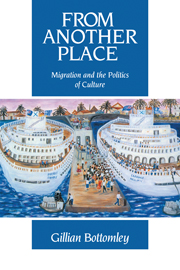Book contents
- Frontmatter
- Contents
- Preface and acknowledgements
- Part I Migration studies and the problem of culture
- Part II Practising cultures
- Chapter 4 The politics and poetics of ethnicity
- Chapter 5 Dance, music and relations of power
- Chapter 6 Re-negotiating ‘tradition’: the case of dowry
- Part III Constructing identities: gender, class, and ethnos
- Bibliography
- Index
Chapter 5 - Dance, music and relations of power
Published online by Cambridge University Press: 05 November 2011
- Frontmatter
- Contents
- Preface and acknowledgements
- Part I Migration studies and the problem of culture
- Part II Practising cultures
- Chapter 4 The politics and poetics of ethnicity
- Chapter 5 Dance, music and relations of power
- Chapter 6 Re-negotiating ‘tradition’: the case of dowry
- Part III Constructing identities: gender, class, and ethnos
- Bibliography
- Index
Summary
If I can't dance, I don't want to be part of your revolution.
attributed to Emma GoldmanSo far, I have argued, with reference to a number of relevant studies, that people negotiate cultural materials and practices in the struggle for symbolic capital. Yet ‘culture’ has been either reified – in the emphasis on traditions – or marginalised – as irrelevant or ideological – in a good deal of the migration literature. In fact, as we have seen, culture is both centrally important and constantly in process. But the connections between cultural beliefs and practices and the exercise of social power can only be revealed by detailed and specific analyses.
This chapter will make such an analysis of dance – and, to a lesser extent, music. I will trace a number of themes here: one has to do with the ways in which dance has been represented, the ways in which people have written about and acted on behalf of dancers. Another raises the question of how the dances may represent the social realities of the dancers: I am treating dance itself as a muted mode that may convey some knowledge not articulated in available representations of the social world. In his brilliant book, Noise: the Political Economy of Music, Jacques Attali, referring to Brueghel's painting ‘Carnival's quarrel with Lent’, pleads to be able to ‘hear’ the Round Dance in the background of the painting.
- Type
- Chapter
- Information
- From Another PlaceMigration and the Politics of Culture, pp. 71 - 88Publisher: Cambridge University PressPrint publication year: 1992



